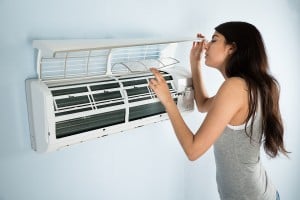Summer is in full force and the temperatures are soaring here in southern Oregon. As landlords or property managers we know that when the seasons change, whether it’s that first cold snap in the fall or the beginning of the hot summer months this is the most prevalent time for calls regarding malfunctioning heating and air conditioning systems. The calls are coming in with complaints of a/c units that aren’t keeping up with these hotter temps. Sometimes I wish the properties I owned didn’t come equipped with HVAC systems and either had no a/c or a cheap window unit. The cost of repairing or replacing these systems can be quite high, which is why I opt for hiring a local furnace and ac specialists to get them fixed rather than purchasing a new one which will set me back a few hundred dollars. Don’t get me wrong I want my tenants to be happy and comfortable but there are legalities when it comes to having heating and cooling repaired.
It’s the law that landlords repair the primary heating and air conditioning system and major appliances at a rental property in a timely manner. If a landlord fails to do so they are breaking the lease agreement. If the landlord is taking all reasonable steps to try and get a repairman to come fix the problem then that is generally all that is required. It’s out of the landlords hands if the repairman has jobs ahead of yours or if a part needs to be ordered to make the repairs. In my home state of Oregon the law states that if the landlord “deliberately or negligently” fails to supply tenants with these essential services, the tenant can choose to remedy the situation themselves. If the landlord is attempting to have the repairs completed, the following options are not available to the tenant. If the landlord has not taken the appropriate steps to have repairs made a tenant can choose one of the remedies below.
1.The tenant can stay at a motel and deduct the amount that rent costs/day from the motel bill
2. The tenant can sue for diminished rental value
3. The tenant can rent an a/c or heating unit and deduct the cost from the rent.
4.The tenant can file a five day Health and Safety Noncompliance notice and if the landlord doesn’t have a solution for the problem within five days the tenant has the right to terminate the lease agreement, move out, and get their deposit back.
5. The tenant can give the landlord written notice that they are having the repairs done by a licensed and insured contractor IF the repair is less than one-half of one month’s rent or $300.00, whichever is greater.
My advice in a situation where heating and a/c is involved is to be sure to document your attempts to have repairs made and always keep excellent records. If a tenant comes back later and tries to sue for compensation or negligence on the behalf of the landlord you have proof that you took the correct steps to remedy the situation.
